Escaping a world of fast food: Grand Rapids schools tackle hunger, food security with gardens
From providing lessons about growing food in urban spaces to giving children fresh produce to take home, school gardens are playing an increasingly vital role in Grand Rapids' community health landscape.
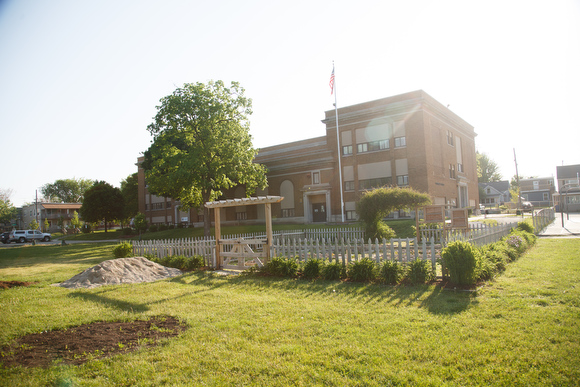
With arms propped on wooden tables in a room bursting with color — green plants and giant, multi-colored alphabet letters and a rug swimming in shades of reds and yellows and blues — a group of third grade students at Congress Elementary School swing legs above a floor that some feet don’t quite reach yet, waiting for the man they call “Farmer Mike” to explain the sea of dirt and seeds before him.
“Today, we’re going to plant Red Russian Kale,” says Farmer Mike, who, when he’s not in a classroom filled with eight- and nine-year-olds, is known as Mike Miller, the farm director and community liaison at Brewery Vivant.
“Red Russian Kale! Red Russian Kale!” one child yells and claps, prompting giggles from peers flanked by tomato, onion and broccoli plants.
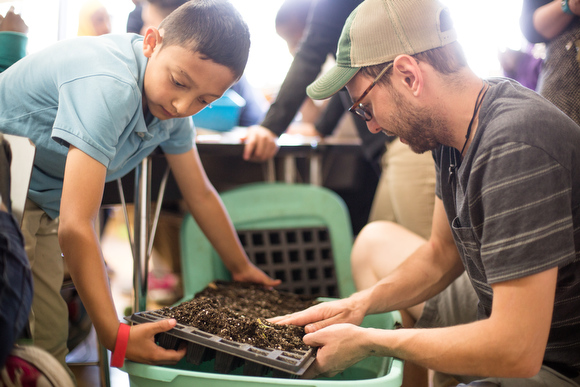
That enthusiasm is carried through much of Miller’s lesson about germination Monday morning, with students learning how to plant the kale seeds — and what those seeds will become. The day’s session with Miller is part of the community-school garden program at Congress — an impressive, extensive project that includes lessons on gardening, plants and nutrition. Throughout the year, students do everything from learn how to care for the Cornelius Kos Community/School Garden — a serene plot of land situated in the school’s yard at 940 Baldwin St. SE that allows both pupils and area residents to grow their own food — to take tutorials on composting, healthy eating, cooking, and more. Brewery Vivant and other neighborhood businesses have been major supporters of the garden, with Miller giving regular lessons at the school and Vivant’s executive chef, Christopher Weimer, showing the students how to incorporate food from a garden into their own meals.
“It’s amazing to hear them say, ‘We saw this growing, and now we’re eating it,’” says Renée Howard, a third grade teacher at Congress who helps to oversee the garden program.
That you yourself can take control of the food you eat — and that you can do so affordably — is a crucial lesson for the students at Congress, an incredibly diverse group of children that includes individuals who are immigrants and refugees, students whose families have lived in the neighborhood for generations, individuals who qualify for free and reduced lunch, and others who come from more affluent families.
Together, the students, who are coming from Midtown, East Hills and Eastown, learn of the country’s problematic food system — a landscape where the world’s most productive agricultural system fails to adequately feed a good chunk of its country’s population.
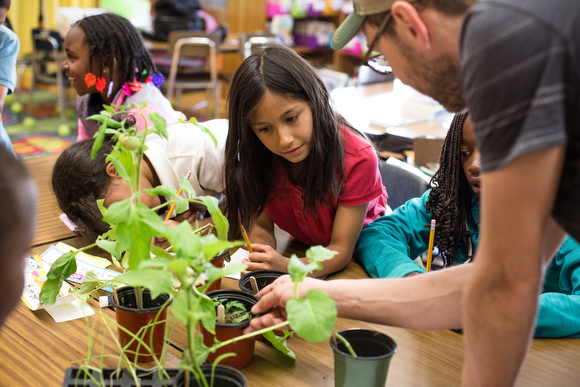
“We had a lesson about food deserts,” Howard says of the areas in which residents find it almost impossible to track down healthy food, including fresh fruits and vegetables, and instead have access to a wealth of processed, sugary and fat-laden foods. “We see these things at school will further translate to home, like when they go out shopping with mom and dad.”
The notion that the lessons learned in the garden will translate to the students’ lives at home is one that’s taking root throughout Grand Rapids, with schools such as Congress, North Park Montessori, Martin Luther King Jr. Leadership Academy, and Gerald R. Ford Academic Center creating school gardens, often in partnership with local community groups and residents. While many of the district’s gardens are relatively new — Congress’s, for example, was launched in 2013, the role they could play in the health of Grand Rapids children is expected to be transformational.
“I don’t think the potential is even close to being seen how huge this could be,” Congress Elementary School Principal Erek Kooyman says. “It has so many implications for our community — our micro economy, our community health. If we can find ways to get [the students] involved in learning and understand what it means to grow food, the sky is the limit.”
What kind of a need is there for access to healthy food in GR?
A focus on gardening and healthy eating is, of course, important for all students, but it holds particular weight in schools where many of the children are living at or below the poverty level, as these students frequently have a harder time accessing enough healthy food, both because of finances and proximity to shops that sell affordable produce. At schools such as Congress, MLK and Ford, 80 percent or more of the students are living at or below the poverty level.
And these schools certainly aren’t alone. According to Access of West Michigan, a group that works to eliminate hunger and poverty in the community, more than 20 percent of children in Kent County are considered to be food insecure — meaning they don’t always know from where their next meal will come, nor do they have enough access to healthy food. In West Michigan, food insecurity affects one in eight people, and that number grows when looking solely at the region’s children. One in five children is food insecure in West Michigan and the Upper Peninsula, according to Feeding America West Michigan.
As Feeding America West Michigan notes, “food insecurity affects every aspect of life, from education and health to a child’s cognitive development.” Numerous studies have pointed out that children who are food insecure are more likely to require hospitalization, may be at higher risk for chronic health conditions (such as anemia and asthma), can more frequently face oral health problems, be more likely to be absent from school, and experience behavioral issues, among other problems.
For years, educators and nonprofits have worked together to tackle the hunger that often accompanies poverty in Grand Rapids, including the YMCA offering what’s known as the “Veggie Van,” which delivers fresh produce to low-income areas — such as making regular stops at schools, and Kids Food Basket teaming up with schools across the city to provide sack suppers to students who had often faced going without dinner. Now, to build upon that anti-hunger work, school officials and nonprofit leaders are setting their sights on school gardens.
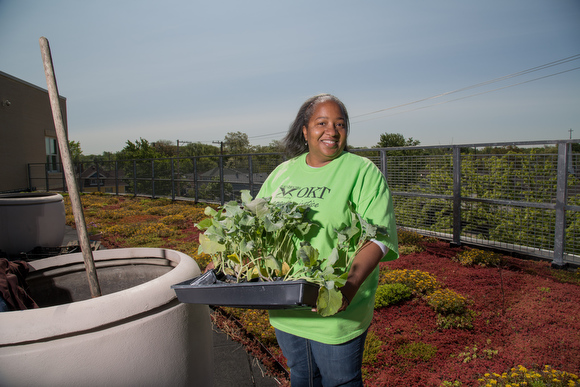
“There’s a real cry of food insecurity here in Grand Rapids,” says Lisa Oliver King, executive director of Our Kitchen Table, a nonprofit that works on a myriad food justice issues in the area by, for example, providing farmers markets, offering healthy cooking demonstrations, and helping residents set up their own urban gardens. Now, OKT has partnered with MLK and Ford to create gardens at those schools.
“The number one reason we wanted to work with Grand Rapids Public Schools is because, for students on the free and reduced lunch program, this exposes them and their families to growing their own food,” King says as she stands by the relatively new school garden at MLK — a space that is expected to likely grow a couple hundred pounds of produce, from collard greens and cabbage to cilantro and chives. “Students can take home food from this.”
Sustaining yourself: A focus on health in a world of fast food
While MLK’s garden was just created a couple weeks ago, one of the major lessons educators wanted to convey with it seems to have been heard by many of the students: Why growing your own food matters — and why local and organic do not have to be synonymous with cost prohibitive.
“We talk a lot about how food in the grocery store can have pesticides,” says Rachel Brock, an eighth grade teacher at MLK who oversees the school’s new garden. “The garden allows them to see you can grow your own food and sustain yourself. They’re used to fast and cheap food; this is changing that.”
While Brock oversees the garden, it’s the school’s seventh and eighth grade students who are in charge of caring for it, and they do all the weeding, watering and other daily maintenance. All of their hard work has led to the students already feeling a sense of pride when it comes to the garden, and on a recent morning, a group of students gave Rapid Growth a tour of the space located in front of the school, showing off all the different kinds of plants that exist in it, as well as detailing hopes for its future, including potentially selling some produce at a farmer’s market.
“It’s much better to grow your own food because of all the stuff — the pesticides — that is put into a lot of the food,” says Taviona Clemon, an eighth grade student at MLK. She and a group of other students say they’ve been horrified to learn of all that can go into food being sold in grocery stores, highlighting a particularly egregious report about the dangerous use of pesticides on strawberries.
Ford science teacher George Gleason, who works with the students and Our Kitchen Table on the new indoor garden at the school, too stresses that the green space offers teens a chance to see food in a very different light.
“This is the first time my kids have seen food being grown,” Gleason says, going on to say that students are learning that while fast food may be cheap, that doesn’t mean it’s something that’s positive (and, really, fast food often doesn’t end up being cheaper than healthy food anyway).
“Food can be cheap in America, but does it mean it’s good?” Gleason asks. “I want them to really start thinking about that.”
Plus, King, from OKT, notes that Ford’s indoor garden, which includes eight window boxes, shows students that quite a bit can be grown in a limited amount of space — including in apartments with no yard.
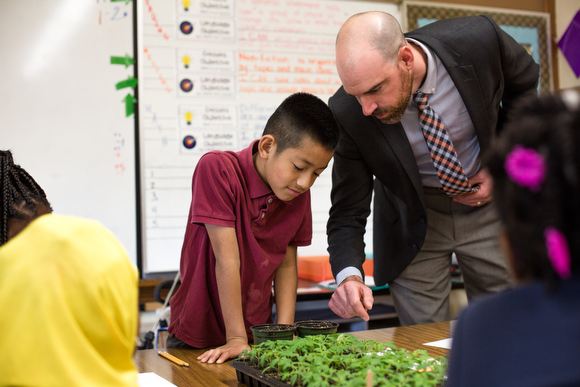
“Folks think growing food is something you need a lot of space for , but this shows you just need some window boxes,” she says.
North Park Montessori, which started its garden about eight years ago, has one of the most extensive gardening programs in the district, offering students a chance to work in flower, produce and herb gardens, as well as an apple orchard that the pupils recently planted. There, students — who have done everything from use their garden’s tomatoes to make 80 bottles of sauce that they sold to study planting techniques under area farmers — speak with fluency about the benefits of gardening in a world that doesn’t always make having a green thumb easy.
“It’s always better to grow your own food,” says Mary Holohan, an eighth grade student at North Park Montessori. “You don’t have to be a big farmer to grow your own food.”
“I was lucky because I already knew about the chemicals that go into food, but, for a lot of people, it was like, ‘Wow, we eat this?” Holohan continues, noting the lessons the school gives regarding gardening and food.
Such an understanding of food, and where it comes from, has made a world of difference for the students, says Nia Davidson, a North Park Montessori teacher who helps students with the gardens.
“They mature while doing this,” Davidson says of the work done in the garden. “They make the connection of where their food comes from; we talk about the carbon footprint.”
Support from community partners
At Congress, MLK, Ford, and North Park Montessori, school officials stress they have received incredible support from the community. Congress, for example, started its garden with a $5,000 donation from the Cornelius Kos family, as well as with support from the East Hills Council of Neighbors. And, as stated previously, Brewery Vivant has partnered with the school to provide support for the garden, which, in addition to providing a space for students to grow produce, is able to be used by students’ families and area residents.
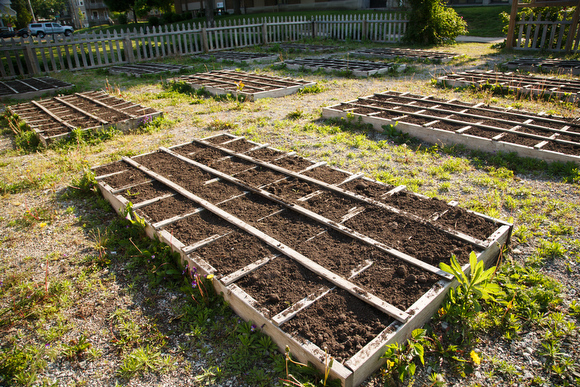
Our Kitchen Table is doing extensive work with MLK and Ford, including providing both a gardening and a cooking coach for the schools and offering tutorials on gardening. The cooking coach shows students how to make meals using accessible, healthy food, such as what they can grow in the garden, items they can find at food pantries, and produce from the YMCA’s Veggie Van. Plus, OKT helped students lay out the soil when students first planted the garden.
“We want to show that you don’t have to go to a health food store to get all of this,” King, of OKT, says.
At North Park Montessori, the school has received a variety of grants and community support, including a grant from Groundswell Michigan. Plus, Friends of Grand Rapids Parks has donated mulch to North Park Montessori, and area farmers have taught the students how best to care for their gardens. To create the first garden — the flower garden at the front of the school — eight years ago, Loew’s provided a $5,000 grant.
School leaders say they have been thrilled with the kind of support they’ve received for their gardens, and educators note that they want to grow these green spaces into something that not only translates to healthier lives for their students, but to the community at large.
“There’s no shortage of people wanting to be supportive,” says Kooyman, the principal at Congress. “We want to explore relationships for the garden — how do we turn this into an educational experience for not only our students but all of the surrounding community?”
This article is part of Michigan Nightlight, a series of stories about the programs and people that positively impact the lives of Michigan kids. It is made possible with funding from the W.K. Kellogg Foundation. Read more in the series here.








